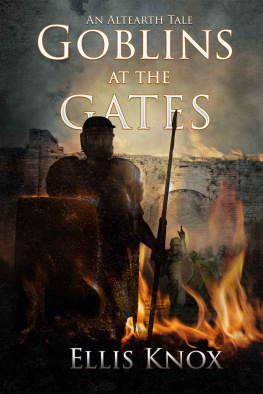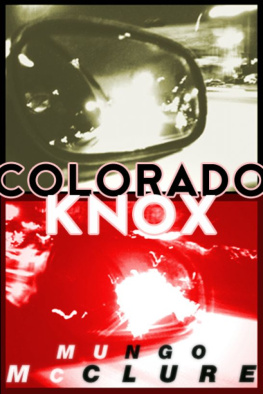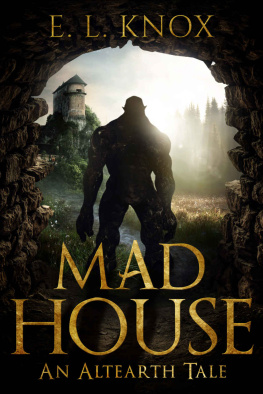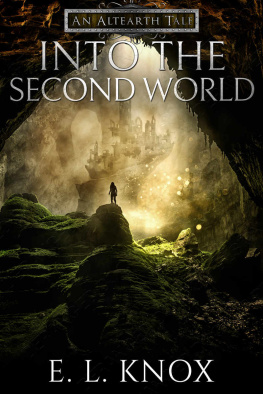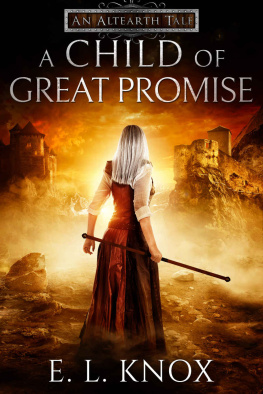Ellis Knox [Knox - Goblins at the Gates
Here you can read online Ellis Knox [Knox - Goblins at the Gates full text of the book (entire story) in english for free. Download pdf and epub, get meaning, cover and reviews about this ebook. year: 2017, publisher: UNKNOWN, genre: History. Description of the work, (preface) as well as reviews are available. Best literature library LitArk.com created for fans of good reading and offers a wide selection of genres:
Romance novel
Science fiction
Adventure
Detective
Science
History
Home and family
Prose
Art
Politics
Computer
Non-fiction
Religion
Business
Children
Humor
Choose a favorite category and find really read worthwhile books. Enjoy immersion in the world of imagination, feel the emotions of the characters or learn something new for yourself, make an fascinating discovery.
- Book:Goblins at the Gates
- Author:
- Publisher:UNKNOWN
- Genre:
- Year:2017
- Rating:3 / 5
- Favourites:Add to favourites
- Your mark:
- 60
- 1
- 2
- 3
- 4
- 5
Goblins at the Gates: summary, description and annotation
We offer to read an annotation, description, summary or preface (depends on what the author of the book "Goblins at the Gates" wrote himself). If you haven't found the necessary information about the book — write in the comments, we will try to find it.
Ellis Knox [Knox: author's other books
Who wrote Goblins at the Gates? Find out the surname, the name of the author of the book and a list of all author's works by series.
Goblins at the Gates — read online for free the complete book (whole text) full work
Below is the text of the book, divided by pages. System saving the place of the last page read, allows you to conveniently read the book "Goblins at the Gates" online for free, without having to search again every time where you left off. Put a bookmark, and you can go to the page where you finished reading at any time.
Font size:
Interval:
Bookmark:
Goblins at the Gates
Goblins at the Gates
by E.L. Knox
Copyright 2017 by E.L. Knox
All rights reserved.
No part of this book may be reproduced or transmitted in any form, whether by electronic or mechanical means, including photocopying, recording, or by any information storage and retrieval system, without the express written permission of the author.
This novel is a work of historical fiction.
Foreword
This is a work of fiction inspired by an historical event, the Gothic invasion of the Empire in 378 AD. I have kept some elements but much of it is pure invention. I say this to reassure my ancient history professor.
There was no XII Legion, though there was indeed a II Herculia, posted at Troesmis.
Valens rebuilt Constantines Bridge, but for my purposes I have left it broken.
I have reversed Maximus and Lupicinus for largely arbitrary reasons, but the scholar of late Antiquity should know that this was deliberate, not a mistake.
The most important deviation concerns Christianity. In Altearth, Constantine did indeed convert to Christianity, but he regarded his conversion as a private affair and never either favored the Church nor hindered the Roman religion. This is a huge change, of course, but for the larger history of Altearth I wanted to keep Christianity a purely local religion, confined to Palestine and parts of Syria. Thus, my characters invoke the gods, whereas by the late 4th century, most everyone in the real Empire would have been Christian.
Other Altearth Tales
The Carrotfinger Man - short story at Aphelion Magazine
The Roadmaster - short story at Bewildering Stories
Mad House - a novelette, available at Amazon
The Garden of Hugo Vuerloz - a novelette available only to subscribers of the Altearth Chronicle
Acknowledgments
An author is always indebted to more people than he supposes. I can thank here only a few.
First, years worth of thanks to my wife for her years worth of patience on this first novel. There were times, Im sure, when it was not at all clear that I would finish it. Without her support and encouragement, its not likely I would have.
Thanks to the Library Group! We dont even have a name, but Heidi and Lorie organized us and kept us going, and the entire group provided invaluable commentary as Goblins developed. Thanks, too, to the fantasy-specific group that spun off the Library: Brandi, Jei, Ken and Patrik. Youre the best.
Thanks, also, to Charles Odahl, my ancient history professor at Boise State University for reading the manuscript and keeping me from making some bone-head mistakes. Any mistakes remaining are entirely my own craftsmanship.
A shout out and a big thanks to Mythic Scribes, the best community on the Net for fantasy writers.
Finally, thanks to Fiona Jayde for her fine work on the book cover, and to Zach Bodenner for the excellent map.
Table of Contents

CHAPTER ONE
A Hill in Dacia
Serapion led his horse away from the ridge top into a little grove of scrub oak where, he hoped, she would not catch the scent of the creatures.
Easy, my great heart, he said as he slipped to the ground. He stroked her neck and held his head close to hers, feeling her muscles quiver with nervousness. She was dangerously close to bolting.
He felt the same way. Even the brief glimpse of what was in the valley had chilled him. As a scout for the XII Legion, his job was to observe and report, not to panic like some palace serving girl.
He tied the mare to a sturdy branch, then crept back to the edge of the hill and laid down. Whatever was down there, he did not want to be seen.
At the bottom of the valley flowed a wide, shallow river, its waters white with minerals and sediment washing down from distant mountains. Stunted trees ran along both sides, barely visible now, for the valley was covered by a flood of dark creatures that moved slowly downstream.
Everywhere in the surging mass, individual shapes leaped suddenly into the air, then fell back again. The bounding shapes were like a herd of antelope on the run. Or , he thought with a shudder, locusts .
They were far too big for locusts, but their hopping motion evoked those terrible insects. A childhood memory swept over him, of his village covered by clouds of whirring wings. His fists clenched and he blinked hard to push the memory away. These were not locusts.
Whatever they were, they were unlike anything hed ever seen or heard of. What they were, though, was not important. The only question for a Roman scout was their number.
He scanned the scene below, trying to come up with an estimate. Thousands, that much was sure, but Captain Ennius would have him skinned if he returned with so vague a report. His keen eyes carved the valley into sections. Ten thousand, at least. Probably more. It was hard to tell because bands of them swirled away, scattering like black snowdrifts up the sides of the valley. Cold dread crawled into his belly as he realized those bands could also be up in the hills behind him. A whinny from his mare sent him scuttling backward.
Forty thousand, he muttered as he untied the horse, and the Captain will have to be content with that.
Forty thousand, he thought as he mounted, but forty thousand what?
They had been too far away for him to see their features, but that hardly mattered. The barbarians in this land had no end of descriptions for them. A single glance at the valley was enough to know that the stories of the past winter were not mere rumors. There was no need to see if they truly had claws that could gut a man at a blow. The legends were real. He could now confirm that; the rest was details.
He reined his horse, turning her back down the slope. Stillness covered the brown earth and filled the gray sky. He leaned forward.
Go, he whispered.
The mare snorted as she sprang into a full gallop. Her hoof beats pounded, and he smelled fear on her. He let her run for a while. She was scared and he was scared, and a good gallop might steady the nerves of both.
After a few minutes of this, he slowed her to a trot, a pace he knew she could maintain for hours. She was still flighty, and shied from time to time, as if scenting something on the wind, except there was no wind, only the cold, damp, motionless air. He rode south along the western slope, keeping the hills between himself and the valley. When he judged he'd put in enough distance, he turned west.
The mare whinnied, dancing sideways. Serapion cast a quick look back. His breath caught. Dark, loping creatures were after him, a dozen or so, moving quickly. He didn't have to urge his horse; she broke at once into a gallop.
The creatures pursued like wolves, with a pack of three gaining on the left and another pack on the right, while the others ran directly behind. They matched his mares speed and he wondered if she could outrun them.
His habits as scout stayed with him as he noted everything he could about them, even as his horse thundered beneath him and the air thundered in his ears.
The beasts were the color of mud, mottled with dark greens and grays and deep crimson. They were smaller than a man, by a head or more, and were oddly shaped. Their legs were powerful, with thighs and hips almost like those of a bear. Their arms were long, and from time to time were used as if they were front legs. Their heads had a snout rather than a nose. Their eyes seemed to be small; it was hard to tell, at a full gallop. When one of them leaped, it covered twenty or thirty feet at a time. With every backward glance, they were suddenly closer.
He leaned into his horse and let her run. He had no doubt the creatures intended to kill him; they were running him the way a wolf pack runs a stag. Only the brown mare and her great heart could save him now.
Next pageFont size:
Interval:
Bookmark:
Similar books «Goblins at the Gates»
Look at similar books to Goblins at the Gates. We have selected literature similar in name and meaning in the hope of providing readers with more options to find new, interesting, not yet read works.
Discussion, reviews of the book Goblins at the Gates and just readers' own opinions. Leave your comments, write what you think about the work, its meaning or the main characters. Specify what exactly you liked and what you didn't like, and why you think so.

